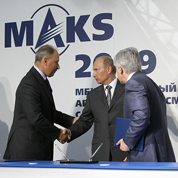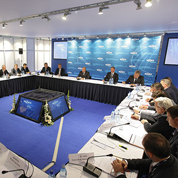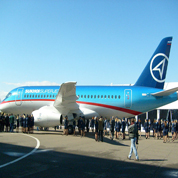Avalanches of mega deals at MAKS-09 as companies defy global crisis on unparalleled shopping spree

Thus, according to the MAKS-09 organizers, contracts worth over $10bln were signed during the aviation exhibition. “This sum far exceeds similar volumes of contracts penned during the last two MAKS exhibitions in 2005 and 2007,” the organizers specifically noted at the event’s closing press conference, where the preliminary results were announced. “For comparison, the sums of contracts penned during the aviation show in 2007 totaled $3bln and $5bln in 2005.” MAKS, a biannual event, offers a platform for the demonstrations of the latest local and foreign aviation products, from super civilian helicopters and small-, medium to large-fuselage planes to the most complicated military bombers and other hi-tech defense gadgets. Traditionally, the exposition is hosted on the territory of the Gromov Flight Research Institute in the city of Zhukovsky in the Moscow Region.
Signing of multibillion contracts
The biggest beneficiary of the mega-spending spree at MAKS-09 was Sukhoi, the state-owned defense gadgets-corporation that makes the legendary SU-fighters, which penned three strategically important and lucrative agreements with the Russian Defense Ministry, under which the corporation will supply the Russian Air Force (RAF) with 48 Su-35 bombers in 2010-15. With each bomber carrying a price tag of about $30mln, the total deal was valued at over $3bln. Besides, Sukhoi will also supply other strategic fighters to the RAF, including 12 Su-27SM fighters from 2009 to 2011 and four twin-engine Su-30M2 new generation fighters by 2011.
“Contracts worth $10bln were signed at the MAKS-09 aviation exhibition, a sum that far exceeds volumes of similar contracts penned at the MAKS exhibitions in 2005 and 2007.”
It, therefore, goes without saying both Sukhoi Corp. management and other signatories to the historic contracts were effusive with joy and praise over the impact the deal will have on the military aircraft maker and the entire Russian defense and civilian aviation industry. “These long-term contracts will give us the opportunity to now focus more on new productions rather than modernizing the existing models of aircraft currently being used by the RAF, Sukhoi CEO Mikhail Pogosyan, said after the official signing of the agreements at MAKS with Deputy Defense Minister Vladimir Popovkin. Russian Prime Minister Vladimir Putin, who was also present at the official signing ceremony of the historic contracts, put the gross price tag of the entire deal at over Rub80bln, calling it a ‘record sum’ in the history of Russia’s defense-related transactions.
Indeed, Sukhoi was ubiquitous at the show’s deals signing tables, as its key subsidiary, Sukhoi Civil Aircraft Co., the corporation’s arm that handles the production of the much advertized SuperJet-100, a new generation of Russian-made passengers jet that is largely expected to revolutionize both the domestic, and indeed, the global civil aviation markets, also landed several lucrative deals, both from the Russian government and several private-sector companies. One of these was Vneshekonombank (VEB), the government bank handling state’s strategic assets outside the country that was recently boosted with unprecedented capital infusion to bailout distressed banks and other companies, which will help bankroll Sukhoi’s key investment programs. Specifically, the bank has agreed to help Aeroflot fund the leasing of a significant number of Superjet planes. “VEB has already extended to its subsidiary VEB Leasing Co. the first credit line for the purchase of 10 planes, which is about $250 million,” VEB CEO and President Vladimir Dmitriyev added.
Other notable deals included VEB’s penning of a partnership agreement with Ilyushin Finance Co. (IFC) to bankroll the purchase of about 70 planes, including six planes for Rossia Airlines, valued at about Rub3bln. VEB holds a 21.3% stake in IFC, the financial subsidiary of the state-owned United Aircraft Corporation (UAC), and thus helps provide funding to other companies and airlines that want to secure UAC planes. It is under such arrangement that a deal was also signed at MAKS to help fund the leasing of 30 new An-148 jets and 15 new Tu-204SM jets, or a gross total of 45 planes, to Atlant Soyuz, the official airline of the Moscow city government, for $1.2bln.

The Moscow city government holds the controlling stake of 51% in the airline, which is currently being transformed into a new airline, Rosavia, whose shareholding structure after the reorganization will be split between the Moscow government and Russian Technologies Corp., which will join the new airline’s board in capacity of a majority stake holder, in the ratio of 49% to 51%. The first batch of the An-148 jets is expected to be delivered to Atlant Soyuz in 2010 and rest is expected to be completed by 2012, while the delivery of the Tu-204SMs will commence in 2011 and run for two years till 2013. Besides, Russian Technologies Corp. has also announced plans to buy 65 narrow-fuselage planes from both Russian and international passenger aircraft producers to boost Rosavia’s fleet.
Commenting on the deals penned with the participation of VEB at the MAKS, Anatoly Sapelin, VEB director in charge of industry, noted that all the transactions inked by the VEB management during this year’s is an indication of the constancy of the bank’s strategic policy of supporting the most advanced sectors of the Russian economy. “It is our belief that these efforts will help generate the minimum level of demand for planes that will enable the local aviation industry to remain afloat and operate out of the red.”
Aviation industry a sphere of state’s strategic commitment
The Russian government also used the MAKS-09 to stress its strategic commitment to the local aviation industry. “The development of aircraft construction and aeronautics is one of our unconditional priorities today. This is because our plans for the comprehensive diversification of our national economy and boosting its hi-tech components are directly linked with the overall development of our aviation industry,” Putin said at the MAKS-09’s opening ceremony. The prime minister also noted that the volume of state funding for the industry has jumped by 20 times since 2004, while the government has already pumped additional Rub80bln into the industry in 2009 for the purchase of new locally made planes and technical modernization and re-equipment of the nation’s aircraft manufacturing companies.
Besides, the Russian government plans to additionally infuse Rub3.2bln into Sukhoi Corp., and about Rub15bln into MiG Corp., the manufacturer of the legendary MiG bombers, in 2009. “And we plan to continue to channel huge investments and serious resources into the creation of highly competitive aviation companies, capable of capturing significant shares on the global aviation market and attract all the necessary resources for the modernization, technical overhaul and full re-equipment of their production facilities.” The ultimate aim is for Russia to produce over 500 units of civilian aircraft per year, and capture between 10-15% share of the global market, while fully satisfying the domestic airline companies’ demand for top-quality competitive aviation products, according to the state program for the development of the industry.
Meanwhile, the growing role of the Moscow Aviation Salon in the local and global aircraft manufacturing and related services industries has long caught the attention of the domestic players and international giants on the aircraft services market. This is evident in the presence of the representatives of such multinationals as Boeing Corp., Airbus Corp. and other global aviation titans at the show to court new partners, new specialists and raw materials for their vast Russian-based and international operations.
“It is nice to acknowledge the fact that MAKS has now occupied a place befitting it in the elite club of selected global aviation salons.”
The overall mood and the strategic goals of these global giants on the Russian market were summarized by Sergei Kravchenko, the Boeing Corp.’s president for Russia and CIS, when he noted that his company, being the largest client and buyer of titanium products from Russia, sees the salon and the entire local aviation industry in positive perspectives and particularly as a source of gainful employments for the younger generation of Russian aviation engineers. “We are the only company that will be producing final products from Russia’s titanium, locally here in Russia, for the global aviation industry and markets,” he noted. “This is very important, especially today, when a new younger generation of engineers, scientists, etc. is coming into the Russian civilian aviation industry, for there to be new projects, Russian projects, which they can work on, here in the country.”
This year’s success elevates MAKS into the elite premier league
Characterizing this year’s spectacular results, Vladimir Borisov, CEO of MAKS-2009, was happy with the run of events, which was able to flourish and meet set standards, despite the negative clout of the global economic crisis that had kept some of the previous key participants away from the aviation exhibition. “Naturally, the global economic crisis has left its negative footprints on the show this year. However, we were still able to record an almost the same number of participants in terms of the area of the exhibition spaces and the numbers of the displayed craft and services as were registered at the 2007 show,” he added. According to official data, over 700 companies from 34 countries graced the occasion, while over 550,000 individual visitors, including VIP guests, attended the events this year. “To us, this was a very good result,” Borisov noted.
Similarly, Dmitry Shugaev, the head of the chancellery of the president and CEO of Russian Technologies Corp., one of the key players at the salon, both as an exhibitor of high-tech products and services and signatories of the numerous deals penned at the expo, called MAKS-09 a huge success. “It is nice to acknowledge the fact that MAKS has now occupied a place befitting it in the elite club of selected global aviation salons,” he added. And commenting on the historic volume of deals penned this year, he called the contracts and the sums involved ‘extraordinarily significant,’ both for Russia as a whole and the individual companies that penned the contracts in particular.

Consequently, both local and foreign experts in view of this year’s spectacular performance now believe that MAKS, in terms of the volume of contracts concluded in 2009, has finally joined the elite premier league of select global aviation exhibitions, where sums of penned contracts are usually measured in tens of billions of U.S. dollars or euros. For comparison, the sum of contracts penned at the British aviation exhibition at Farnborough last year stood at $30bln, while a similar volume of contracts signed at the famous French Le Bourget aviation expo in the Paris suburbs superseded 10bln.euros.
Though MAKS is currently far from the key leaders in this area — the British Farnborough and the French Le Bourget — the general trend is positive, thus making the MAKS organizers’ stated goal of joining the top global aviation products and services exhibition platforms much clearer and realizable, not only in terms of volumes of concluded contracts, but also in terms of its overall effects on the global aviation industry, as one of the key trends- and pacesetters in this high-tech segment of the Russian and global economies.












 Web design,
Web design,